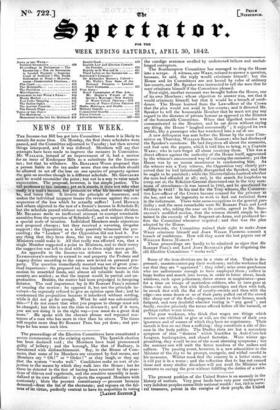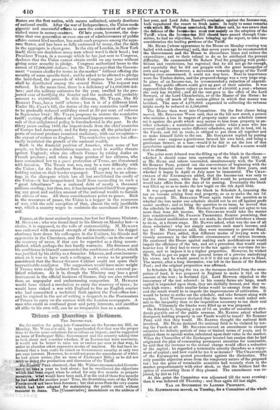The present position of the United States is an anomaly
in the history of nations. Very poor lands have very poor exchequers; very indolent peoples amass little national wealth : but, rich in natu- ral treasures, potent in the energies of their people, the United States are the first nation, with means unlimited, utterly destitute of national credit. After the war of Independence, the Union made gigantic and successful eflittrts to earn the endowment of an untar- nished name in money-matters. Of late years, however, the doc- trine that one generation -or even one set of administrators of public affairs cannot bind another, has made such progress among the sepa- rate States, and has been so fully embraced by many, that the faith in the aggregate is clean gone. In the city of London, in New York itself, there are doubtless many men whose word is their bond ; but President TYLER, in a message which he has just sent to Congress, declares that the Union cannot obtain credit on any terms without giving some security in pledge. Congress authorized loans to the extent of 17,000,000 dollars ; but Mr. TYLER says that the Govern- ment "cannot chaffer for terms in the market" without offering the security of some specific fund ; and he asked to be allowed to pledge the land-fund, the proceeds of which Congress has just enacted shall be distributed among the several States. The request was refused. In the mean time, there is a deficiency of 14,000,000 dol- lars; and the military estimates for the year, swelled by the pro- jected cost of fortifying the frontier and the seabord, will probably amount to 40,000,0001. In this dilemma, Mr. TYLER, like Sir -Bonner PEEL, has a tariff scheme ; but it is of a different kind. Under Mr. CLAY'S bill, the duties of the very restrictiie tariff were to be gradually reduced until they stood at 20 per cent. ad valorem in September 1842: Mr. TYLER proposes to restore the restrictive tariff; cutting off all chance of increased import-revenue. The re- sult of that enlightened policy is foreshadowed in the past. In the thirty years ending 1839, the import-trade from the chief countries of Europe had decreased; and for forty years, all the principal ex- ports of natural produce remained stationary, with one exception— the export of cotton to England. The restrictive system has effec- tually restricted the growth of the national wealth. Such is the financial position of America, when some of her people, we believe a diminishing number, revel in warlike threats against England ; when she offends France by raising duties on French produce ; and when a large portion of her citizens, who have committed her to a quasi protection of Texas, are threatened with invasion. The Texan war, too, may be a sore difficulty with the Union ; for the Southern States would regret to see a slave- holding nation on their border expunged. There may be an advan- tage in the disrepute which has all but annihilated the credit of the Union—it has incapacitated itself from succeeding to such a "great inheritance" as a national debt of nearly a thousand millions sterling; but then, too, it has incapacitated itself from grasp- ing any great and sudden amount of the national wealth to furnish the sinews of war. All these considerations point to peace. Rich in the resources of peace, the Union is a beggar in the resources of war, with the sole exception of that, almost the only justifiable war, which a country wages to maintain the sacredness of its own soil.



























